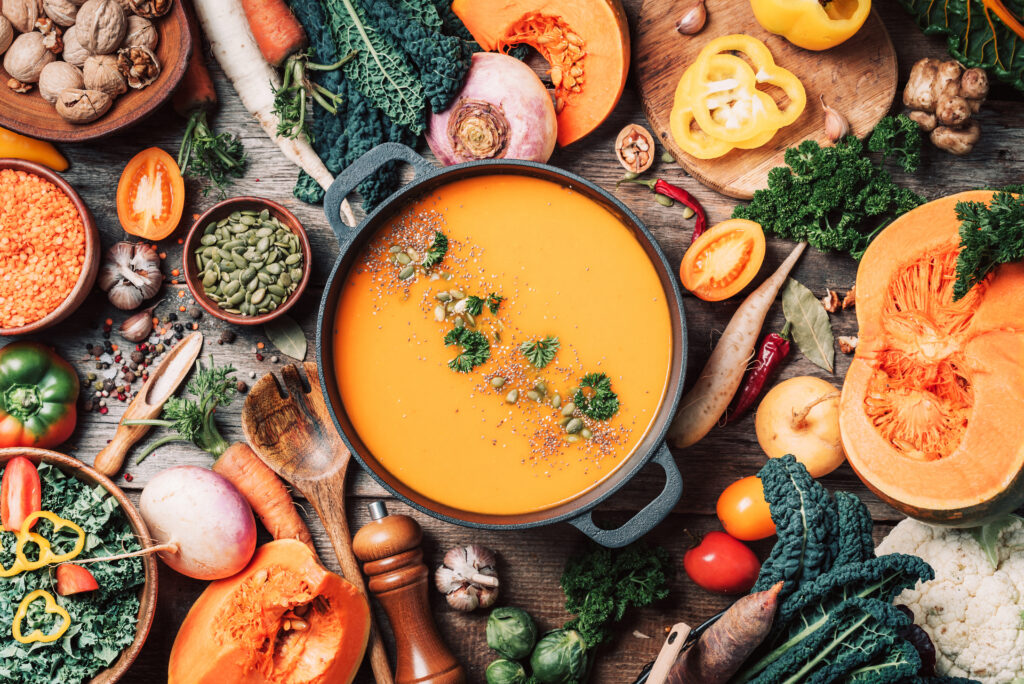
This winter, one goal to consider is to add heart-healthy fruits and vegetables to your diet. Diet is a crucial factor in determining your risk for heart disease, and the wrong food choices could make you more likely to develop diabetes, high blood pressure, and obesity, which scientists have linked to heart disease. Poor-quality diets include foods that are high in salt, sugar, refined grains, and unhealthy fats. Unfortunately, these foods are often convenient and inexpensive.
Whether you already have heart concerns or want to prevent them, turning to heart-healthy fruits and vegetables makes a difference. They’re rich in vitamins, minerals, and fiber. Most fruits and vegetables also have powerful antioxidants that may help you avoid the kind of oxidative stress that puts a strain on your heart. To give your ticker a boost this winter, turn to some of the best heart-healthy fruits and vegetables.
Winter Squash for Antioxidants
Antioxidants called carotenoids give winter squash its orange color. The most popular carotenoids are beta-carotene, lutein, and alpha-carotene, all of which help combat oxidative stress.
Winter squash contains these carotenoids, along with vitamin A, which also helps reduce oxidative stress that can impact your heart. Acorn squash and butternut squash are popular varieties, along with spaghetti squash, delicata, and pumpkin.
To best enjoy butternut squash, grill or roast it with a bit of olive oil or turn it into roasted butternut squash soup. You can pair acorn squash with other vegetables for a vegetarian meal or eat it alongside a lean protein like roasted salmon. Make sure to store winter squash in a cool and dry spot until you’re ready to use it.
Pomegranates for Ellagic Acid
Pomegranates are a superfood that may keep your heart healthy because of a micronutrient they contain called ellagic acid. Ellagic acid blocks the buildup of cholesterol in the arteries. Pomegranates are also rich in potassium, which helps control high blood pressure.
Although drinking pomegranate juice is helpful, eating pomegranate seeds is even better. Include them in oatmeal, cereal, or yogurt for breakfast, or add them to salads. Combining pomegranate seeds with avocado offers a crunchy and creamy treat.
To get to the seeds without struggling, cut off the top and bottom of the fruit and then quarter it before soaking the quarters in water until they separate from the skin. You can drain and dry the seeds if you plan to use them later.
Green Beans for B Vitamins
B vitamins, especially vitamin B6, are vital for your heart. Vitamin B6 may prevent clogged arteries, reducing your risk of heart disease. [National Library of Medicine] Green beans are also rich in fiber, which helps reduce cholesterol levels.
For the most benefits, eat fresh green beans instead of canned ones (canned foods are often high in salt). Roast or steam green beans to retain their nutrients, and consider adding spices instead of burying them in a cream sauce. Add green beans to salads or serve as them a side to a lean protein to maximize the heart-healthy benefits.
Until you’re ready to use green beans, store them unwashed in a bag or container in the fridge. Use them within seven days.
Apples for Pectin
The peel of an apple is rich in two nutrients that are great for your heart: pectin and quercetin. Pectin prevents the absorption of cholesterol, helping lower your overall levels. Quercetin is an antioxidant with vasodilating effects, improving blood flow and reducing inflammation.
You can eat apples raw, of course, but they are also tasty when cooked. For a unique flavor, chop them up and saute them with onions and spices like basil and rosemary. Baking apples whole with a few cinnamon sticks is another excellent option. Add a bit of low-sugar peanut butter to a slice of apple for a filling snack that is still heart-healthy.
To keep apples crisp, ensure they receive ventilation. You also want to store them in a cool and dry spot.
Adding More Heart-Healthy Fruits and Vegetables to Your Diet
Fruits and vegetables are essential for your health, providing the nutrients that keep your heart functioning at its best. Eating fruits and vegetables doesn’t have to be boring or a chore, especially if you take the time to include unique spices or combine flavors you wouldn’t have thought to put together.
This winter, challenge yourself to create meals around heart-healthy fruits and vegetables — your heart will thank you for it.
Resource Links
- “Heart disease and diet” via National Library of Medicine
- “Food Consumption and its Impact on Cardiovascular Disease” via National Library of Medicine
- “Oxidative Stress in Cardiovascular Diseases” via MDPI
- “The Benefits and Risks of Certain Dietary Carotenoids that Exhibit both Anti- and Pro-Oxidative Mechanisms—A Comprehensive Review” via National Library of Medicine
- “Effects of Oral Carotenoids on Oxidative Stress: A Systematic Review and Meta-Analysis of Studies in the Recent 20 Years” via National Library of Medicine
- “Vitamin A as a Transcriptional Regulator of Cardiovascular Disease” via MDPI
- “Ellagic Acid” via National Library of Medicine
- “How Potassium Can Help Control High Blood Pressure” via American Heart Association
- “Association between B Vitamins Supplementation and Risk of Cardiovascular Outcomes” via National Library of Medicine
- “Dietary Fiber Is Beneficial for the Prevention of Cardiovascular Disease via National Library of Medicine
- “Cholesterol-lowering properties of different pectin types in mildly hyper-cholesterolemic men and women” via Nature Journal
- “Therapeutic potential of quercetin as a cardiovascular agent” via ScienceDirect